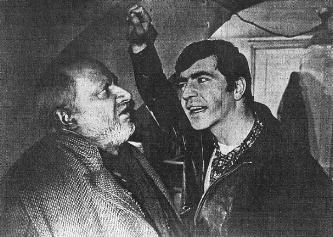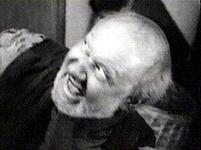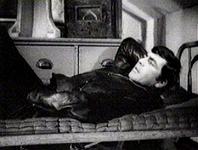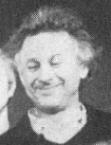Alan Bates
(Mick)
Donald Pleasence
(Mac Davies/Bernard Jenkins)
Robert Shaw
(Aston)
Director:
Clive Donner
Screenplay:
Harold Pinter
Based on a
play by:
Harold Pinter
Producer:
Michael Birkett
Berlin International
Film Festival:
---Silver Berlin Bear (award won by Clive Donner)
---Golden Berlin Bear (nomination received by Donner)
Critics have offered all sorts of hidden meanings to the play while Pinter has always maintained his silence, preferring instead to play his little game and let you attempt to figure out what the hell he meant by it all.
Pinter is infuriating but endlessly fascinating; sort of like a rattlesnake with a typewriter.
---THE MOTION PICTURE GUIDE ANNUAL
Superior cast and superb performances, but claustrophobically directed by Donner.
---LEONARD MALTIN'S MOVIE & VIDEO GUIDE
...the whole thing is an absorbing, spooky, realistic fairy tale which, as far as I'm concerned is the "Theater of the Absurd" at its best.
---Philip T. Hartung of THE COMMONWEAL
The play's fetid, claustrophobic atmosphere has been, if anything, intensified by director Clive Donner's insistent use of enormous close-ups throughout the entire film.
---Arthur Knight of SATURDAY REVIEW
Rather doleful filming of the fashionable play with its non-plot, irregular conceits and interesting interplay of character. It remains a theatrical experience.
---HALLIWELL'S FILM GUIDE
...it's a one-set play, and that made it a tough assignment for director Clive Donner. His fluent treatment, however, makes the most of the macabre verbal exchanges, and overcomes many of the static handicaps of the subject.
Donald Pleasence's standout performance as the tramp is the acting highlight, but he easily has the choicest role. Robert Shaw gives an intelligent study as the brother who offers the tramp shelter, while Alan Bates completes the stellar trio with another forceful portrayal.
---VARIETY MOVIE GUIDE

When Harold Pinter's The Caretaker opened on Broadway two seasons ago to a success both popular and critical, its director (Donald McWhinnie) told its author, "It could make a marvelous film. Very claustrophobic." A film has been made of The Caretaker, retitled The Guest, with a new director, Clive Donner, but with the script written by Pinter himself, and the same three-man cast that performed it on Broadway. The result is a marvelous film. Very claustrophobic.
Two brothers live in a cluttered
attic of a rundown house somewhere in London. One of them invites
a scrofulous bum to share the lodgings, and what follows is a
game of verbal volleyball among the three. Through electric shock
treatment, Aston, the older brother (Robert Shaw) has been reduced
to a stolid, mechanical half-man who dreams of building a shed
in the yard. "Until I do," he says, "I can't get
started." Aston has no intention of ever starting. Davies
(Donald Pleasence) is  the
guest, a mean, suspicious, shabby rotter, who has no home and
no shoes (only sandals), accepts the charity but immediately
complains about the insufficiencies. He asks Aston to find him
shoes, then refuses them. "Good shoes this," he admits.
"Don't fit though," he grumbles. Davies' past is in
his papers, and his papers are in the town of Sideup. Without
them he has no identity; he talks about getting them, but never
will. Mick (Alan Bates) is the most shadowy of these grotesques.
A malevolent manipulator of words, he tricks Davies into calling
Aston names, then attacks him for it. He is always at least on
the brink of abuse. All three gnaw at each other, for no apparent
reason except that it is the nature of man to gnaw. "To
disclose to others the poverty within us is too fearsome a possibility,"
offers Pinter as one clue to The Caretaker.
the
guest, a mean, suspicious, shabby rotter, who has no home and
no shoes (only sandals), accepts the charity but immediately
complains about the insufficiencies. He asks Aston to find him
shoes, then refuses them. "Good shoes this," he admits.
"Don't fit though," he grumbles. Davies' past is in
his papers, and his papers are in the town of Sideup. Without
them he has no identity; he talks about getting them, but never
will. Mick (Alan Bates) is the most shadowy of these grotesques.
A malevolent manipulator of words, he tricks Davies into calling
Aston names, then attacks him for it. He is always at least on
the brink of abuse. All three gnaw at each other, for no apparent
reason except that it is the nature of man to gnaw. "To
disclose to others the poverty within us is too fearsome a possibility,"
offers Pinter as one clue to The Caretaker.
The author says all this is funny only "up to a point. Beyond that it ceases to be funny, and it was because of that point that I wrote it." That point is the halfway house gallows humor, the chuckly affirmation that life can be ghastly. There is no contradiction here, just as there is none in the fact that Pinter's greatest laugh lines are often wicked pauses.
 Pinter
has kept The Caretaker the same except for certain
embellishments he would have used on stage if it had had the
scope of the screen. And even though most of his new excursions
are outdoors, he has lost none of the claustrophobia. For example,
Davies sits on a park bench, looking like an overturned can of
garbage. Suddenly, Mick, in a pickup truck, stops short in front
of him, beckons for him to get in. When Davies does, Mick snaps:
"We're going to get your papers." The old man cringes
and the truck zooms away, but only once, quick, around the block,
then stops short back in front of the bench. "I've changed
my mind," says Mick, and shoves Davies out. The scene, like
so many others in The Guest, is harrowing, malicious,
antic---and peculiarly Pinter.
Pinter
has kept The Caretaker the same except for certain
embellishments he would have used on stage if it had had the
scope of the screen. And even though most of his new excursions
are outdoors, he has lost none of the claustrophobia. For example,
Davies sits on a park bench, looking like an overturned can of
garbage. Suddenly, Mick, in a pickup truck, stops short in front
of him, beckons for him to get in. When Davies does, Mick snaps:
"We're going to get your papers." The old man cringes
and the truck zooms away, but only once, quick, around the block,
then stops short back in front of the bench. "I've changed
my mind," says Mick, and shoves Davies out. The scene, like
so many others in The Guest, is harrowing, malicious,
antic---and peculiarly Pinter.
Review © 1964 NEWSWEEK. All Rights Reserved.
The brilliant bone-deep acting of Alan Bates, Donald Pleasence and Robert Shaw in Harold Pinter's The Caretaker, when it was a play on Broadway two years ago, is almost precisely duplicated in the film rendering with the same cast, under the compact direction of Clive Donner. It opened yesterday at the Guild. But the title is not duplicated; now it is called The Guest, because Hall Bartlett presented a film called The Caretakers last fall.
 Don't let that title
change disturb you. It is still the same acerbating play that
helped to establish Mr. Pinter as a solon in the "theatre
of the absurd." It is still the same grotesque intermingling
of three mad characters in a cluttered room of a cheap roominghouse
in London, and it still pulls up short, as did the play.
Don't let that title
change disturb you. It is still the same acerbating play that
helped to establish Mr. Pinter as a solon in the "theatre
of the absurd." It is still the same grotesque intermingling
of three mad characters in a cluttered room of a cheap roominghouse
in London, and it still pulls up short, as did the play.
Frankly, I do not think the effort of putting it onto film has given the raw and rumpled drama any more forcefulness or clarity. The queer attitudes of two strange brothers toward a filthy and contentious old bum one of them admits to their drab lodgings remain unexplained and unresolved. The whole incident has no surroundings, as it might have within this medium. It remains a one-day conversational hassle among three wretched characters in a room.
 And the fact that Mr.
Donner has chosen to have most of the scenes played very close,
with the camera crowding rudely right up against the characters'
chests or poking right into their faces, as though they were
Carl Dreyer's Joan of Arc, tends to cause a somewhat spotty pattern
of individual emotions and to obscure the unity of the ensemble
and the bleak insistence of the room. I do not feel myself hemmed
in and menaced by disorder as I did when I saw it on the stage.
And the fact that Mr.
Donner has chosen to have most of the scenes played very close,
with the camera crowding rudely right up against the characters'
chests or poking right into their faces, as though they were
Carl Dreyer's Joan of Arc, tends to cause a somewhat spotty pattern
of individual emotions and to obscure the unity of the ensemble
and the bleak insistence of the room. I do not feel myself hemmed
in and menaced by disorder as I did when I saw it on the stage.
This studied employment of the close-up does achieve one effect, at least: it makes you feel awfully contiguous to these questionably clean characters. And this is particularly discomfiting in the case of the scruffy old bum who is played with such graphic activity, such scratching and twitching by Mr. Pleasence.
 So
close does the camera get to him, so hotly does it breahe down
his neck, that you see every detail of his squalor---his filthy
and tattered clothes, his bad teeth, his beard all flecked with
matter and the beady rheum in his eyes. After more than an hour
and a half with him, you sense not only the dismal thing he is---a
brazen, bullying, selfish, cowardly creature---but also how horribly
he smells.
So
close does the camera get to him, so hotly does it breahe down
his neck, that you see every detail of his squalor---his filthy
and tattered clothes, his bad teeth, his beard all flecked with
matter and the beady rheum in his eyes. After more than an hour
and a half with him, you sense not only the dismal thing he is---a
brazen, bullying, selfish, cowardly creature---but also how horribly
he smells.
This is part of the impact of the picture. The miserable human being that this man is stands out, of course, as the factor most absorbing and repulsive in the film. His insolent toadying and fretting toward the other men, and then his antagonism toward them when they scuff him and push him around, is the singular revelation of the human condition that this film gives. Mr. Pleasence performs this odious creature almost too realistically.
 The
others are strange individuals, evasive but firmly played. Mr.
Bates is violent and eerie as the brother who is evidently insance,
but not so much so that a resemblance to other humans with cold
perversities is not plain. And Mr. Shaw is stolid and poignant
as the one who has has an operation on his brain and goes at
life with gentleness and quiet that provoke a disquieting dread.
The
others are strange individuals, evasive but firmly played. Mr.
Bates is violent and eerie as the brother who is evidently insance,
but not so much so that a resemblance to other humans with cold
perversities is not plain. And Mr. Shaw is stolid and poignant
as the one who has has an operation on his brain and goes at
life with gentleness and quiet that provoke a disquieting dread.
I would not say that this picture offers a rich experience. It is much too narrow, crabbed and disagreeable. But it does give some awesome intimations of what sad, absurd things we mortals be---at least, when put through the wringer of a dramatist of the "theater of the absurd."
From the January 21, 1964
edition of THE
NEW YORK TIMES.
Review © 1964 THE
NEW YORK TIMES. All Rights Reserved.
Into a junk-filled room atop an otherwise empty house in West London totters an old derelict named Davies. Clothes flap on his bony frame like weather-beaten posters on a board fence. A bristling compendium of social evils, he is dirty, mephitic, bigoted, violent, treacherous. "I been left for dead more than once," he rasps. For 15 years he has been trying to make a trip down to Sidcup "to get my papers. They prove who I am. I can't move without them papers."
While waiting for a break in
the weather, as he puts it, Davies---played with uncluttered
perception by Donald Pleasence---burrows into the refuge offered
by a formal mental patient (Robert Shaw), the elder of  two
misfit brothers. Shaw collects things---bales of newspapers,
a disconnected faucet, a kitchen sink, a bud vase full of screws---and
he speaks and moves with the stony detachment of a man who will
never again disturb the balance of his uneasy truce with life.
His goal is to build a workshed out back: "Then I'll be
able to do a bit more with the house." The younger brother
(Alan Bates) retains some link to the workaday world but expresses
his frustration in bursts of sadistic mockery. Davies sets the
brothers one against the other in order to hold onto his job
as caretaker. Finally they turn him out, and all three men are
thrust back into the nightmare isolation whence they came.
two
misfit brothers. Shaw collects things---bales of newspapers,
a disconnected faucet, a kitchen sink, a bud vase full of screws---and
he speaks and moves with the stony detachment of a man who will
never again disturb the balance of his uneasy truce with life.
His goal is to build a workshed out back: "Then I'll be
able to do a bit more with the house." The younger brother
(Alan Bates) retains some link to the workaday world but expresses
his frustration in bursts of sadistic mockery. Davies sets the
brothers one against the other in order to hold onto his job
as caretaker. Finally they turn him out, and all three men are
thrust back into the nightmare isolation whence they came.
With only a smidgen of a plot to drive them, this unholy trio thrashes out a sometimes funny, sometimes corrosive drama based on Harold Pinter's London and Broadway stage success, The Caretaker. It is still morbidly fascinating to watch. And what made the play important remains perfectly clear: dialogue so richly human that every vile syllable sounds like a cry for help, plus superb acting of their original roles by Pleasence, Shaw, and Bates.
But if the playwright's bleak
study of mankind may be an allegory subject to highly colorful
interpretations, it may only be an exercise in ambiguity. The movie falters, too, because the flaws of filmed
theater become obvious whenever director Clive Donner and scenarist
Pinter try most earnestly to "open up" the play in
cinema terms. A room sealed against the real and imagined terrors
of the outside world is the natural hell of Pinter's characters,
and a legitimate theater is an intimate place to share them.
To set them roaming into the street or off to a neighborhood
cafe for breakfast, arbitrarily adds' action but dissipates the
mood so brilliantly sustained onstage. Though this screen adaptation
leaves gaps that an ambitious camera must try to fill, popping
out for a bit of fresh air is not necessarily the answer.
ambiguity. The movie falters, too, because the flaws of filmed
theater become obvious whenever director Clive Donner and scenarist
Pinter try most earnestly to "open up" the play in
cinema terms. A room sealed against the real and imagined terrors
of the outside world is the natural hell of Pinter's characters,
and a legitimate theater is an intimate place to share them.
To set them roaming into the street or off to a neighborhood
cafe for breakfast, arbitrarily adds' action but dissipates the
mood so brilliantly sustained onstage. Though this screen adaptation
leaves gaps that an ambitious camera must try to fill, popping
out for a bit of fresh air is not necessarily the answer.
Unsigned article from the
January 24, 1964 edition of TIME.
Article © 1964 TIME. All Rights Reserved.
Sadly, The Caretaker has never been released on home video in the United States and rarely appears on television. Please write or e-mail The Criterion Collection and ask that they release the film on Region 1 DVD. Address: The Criterion
Collection Click here to e-mail their offices |
|
|
|
|
|
|
|
|
|

[ FILMS | HOME ]